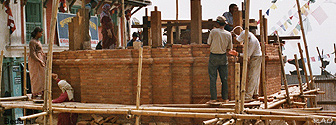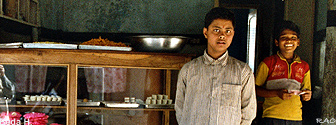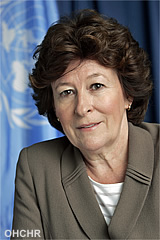 |
| Nepal's Civil War: United Nations & Human Rights |
|
|
|
|
|
|
|
| Human Rights |
| Death in custody of Maina Sunuwar |
21 September 2007 OFFICE OF THE HIGH COMMISSIONER FOR HUMAN RIGHTS IN NEPAL
Dear
members of the media, colleagues and friends, However, I think it is important first to talk briefly about the situation in Kapilvastu. As you may know, I visited the area earlier this week and met with local people. What they told me is that they are frustrated at the government's inaction. Many residents were displaced by the violence that followed the initial killings on Sunday: they have received no humanitarian relief and, of particular interest to this Office, they feel that no efforts have been made to restore law and order in the area, so that they can live in peace. |
|
In the last couple of days there have been reports of many more killings and of various atrocities committed against victims. Our monitors remain in the area on a joint mission with UNMIN, and will stay as long as necessary in order to conduct a thorough investigation into this week's tragic incidents.
Inadequate public security is undoubtedly one of the greatest challenges to human rights - and the peace process - in Nepal today. Violence in the Terai and the lack of appropriate response from security forces in many cases, along with the readiness of many armed groups to use violence and intimidation has highlighted the question: Can an environment conducive to free and fair elections be created?
If the all important elections take place as planned, the process will highlight one of the major human rights challenge facing this country - ensuring that groups that have been historically marginalized in Nepalese society, and women, are adequately represented. This means that members of these groups must have the opportunities not only to vote according to their own wishes but also to participate in all aspects of the pre-election campaign process. And, in order for the elections to be truly inclusive, members of these groups must be represented in the Constituent Assembly.
Accountability for human rights violations and violations of International Humanitarian Law and other international crimes is a long-standing human rights challenge that has not shown signs of improvement since OHCHR was established in Nepal in May 2005. Last year this Office published two reports - one on torture and disappearances by the then Royal Nepal Army's Bhairavnath Battalion, the other on the torture and death of Maina Sunuwar during the conflict. Despite repeated calls from OHCHR-Nepal and others, in neither case has there been a thorough investigation and full and impartial judicial process to determine and punish those responsible.
The Government announced in June the creation of a commission of inquiry into disappearances which took place during the conflict, but that commission will fall short of accepted international standards.
Another major human rights challenge that OHCHR-Nepal has identified is an inadequate law enforcement response and a justice system that is not fair or effective. In the Terai, for example, the lack of a consistent response by the State to illegal activities has created a crisis of confidence among the general public and in some areas a state of fear. To reverse this trend, local governance institutions and the Nepal Police must be re-established in these areas. Security forces must restore law and order, while respecting due process and other human rights.
Now, having laid out some of the human rights challenges as we see them, I would like to discuss OHCHR-Nepal's strategies for dealing with them.
OHCHR
will monitor whether key rights and principles are upheld through the election
process. The rights most relevant during this process include primarily:
![]() The
right to participation
The
right to participation
![]() The
right to non-discrimination
The
right to non-discrimination
![]() The
right to freedom of opinion, expression and access to information
The
right to freedom of opinion, expression and access to information
![]() The
right to peaceful assembly
The
right to peaceful assembly
![]() The
right to freedom of association
The
right to freedom of association
![]() The
right to freedom of movement, and
The
right to freedom of movement, and
![]() The
rights to life, to physical integrity and freedom from arbitrary detention.
The
rights to life, to physical integrity and freedom from arbitrary detention.
OHCHR's
monitoring of the elections process has already begun. A central focus
will be on actions taken locally by security forces, and the administration,
to appropriately manage demonstrations and political rallies peacefully;
to prevent any interference that results in restrictions on the rights
of persons taking part in the elections, whether by the State or by non-State
actors; and to address any other problems that arise.
The
Office also plans to address concerns over human rights and security in
a series of meetings with officials of the Nepal Police and Armed Police
Force. Discussions are likely to include the need for a consistent and
effective response from law enforcement agencies to criminal activities,
one that respects the due process of law. OHCHR-Nepal would also remind
the security and law enforcement agencies of their obligations under international
law to respond to violence, particularly during political protests, with
minimum necessary force.
OHCHR-Nepal has made a number of recommendations to the Government in the past year to assist it in drafting laws and procedures that will ensure the representation of women and historically marginalized groups in the Constituent Assembly elections. This is an extension of our activities - in the areas of advocacy, monitoring and capacity-building - since May 2005 to address long-standing discrimination in Nepal.
An election outcome in which women, Madhesis, Dalits, Janajatis/Adivasis, sexual minorities, the disabled, those from geographically excluded regions and other historically marginalized groups are fairly represented would send an important signal to the people of Nepal that the commitments made by their leaders in the Comprehensive Peace Agreement and other Publications were more than just promises.
In
the coming months OHCHR-Nepal will also increase its efforts to assist
in building the capacity of organisations that represent marginalized groups,
and will monitor the inclusion of such groups into the society. Concerning
monitoring, we have at the moment a team of human rights officers conducting
research missions in various districts to collect information about access
to justice for Dalit women. OHCHR also continues to investigate some 200
cases of disappearances in Bardiya district during the conflict. In many
cases, victims were from the indigenous Tharu community.
This Office will continue to urge the Government and the CPN-M to hold accountable those responsible for past human rights violations. The Supreme Court's decision of 1 June 2007 on disappearances gave hope that calls for truth, justice and reparations for families of the disappeared would be heeded, but the government has yet to implement the court's directive to set up a commission of inquiry based on international human rights standards. OHCHR-Nepal has made public its concerns about the proposed commission of inquiry.
This Office has also provided Government its analysis and recommendations with regard to draft Truth and Reconciliation Commission bill. Regretfully, the bill provides amnesty for gross violations of human rights committed during the 10 year conflict, and thus places Nepal in violation of its international treaty obligations to ensure victims and their families their rights to truth, justice and reparations.
In addition, there is the potential
for significant political interference with the independence, impartiality
and operation of the TRC, which is not consistent with accepted international
human rights standards. I urge the Government to take account of the serious
concerns expressed by civil society and the United Nations, and we will
continue to monitor the process around the bill, including, I hope, the
initiation of meaningful and genuine consultations by the Government with
a wide range of groups throughout the country, including victims' groups,
on the provisions of the bill. OHCHR will continue to provide the Government
and civil society with guidance and advice on international principles
and best practices for the development of suitable transitional justice
mechanisms.
Not with standing the important work of a truth commission, the primary duty of the State is to investigate, prosecute and punish those persons guilty of serious human rights violations.
Ending impunity will require further strengthening of the legal framework. OHCHR-Nepal has already made known to the Government its concerns concerning the Army Act of 2006. While the Act provides for the exclusive jurisdiction of civilian courts in cases of rape and murder, it gives courts martial jurisdiction over cases of torture and disappearance, with the possibility of appeal to the Supreme Court. It may also allow the military, not civilian courts, to exercise jurisdiction over Nepalese Army personnel who commit other serious human rights violations. This Office will continue to urge the Government to amend the Act, and to recommend the ratification of the Rome Statute of the International Criminal Court.
Strengthening
rule of law and the administration of justice begins with ensuring that
existing laws respect Nepal's international human rights treaty obligations,
and, where necessary, drafting new legislation to implement them. OHCHR
will continue to advise the Government on incorporating protection for
human rights into its legal framework as well as monitor to ensure that
laws are enforced and human rights violations are prosecuted. One important
measure of law enforcement on the ground that OHCHR will continue monitoring
is the filing of First Information Reports (FIRs) by police.
In coming months this Office will also encourage the Government to meet its obligations to mainstream human rights in all its institutions, including the police, Army and judiciary.
Another important focus of OHCHR-Nepal's activities that I wish to discuss today is strengthening the capacity of national institutions and civil society for the protection of human rights. This includes first, continued support to the NHRC, an essential partner, with a view to strengthening its effectiveness and credibility in line with the Paris Principles. As you know, this week the new Commissioners were sworn in, after more than one year of the NHRC being without commissioners, which greatly hampered its work. OHCHR very much welcomes this opportunity for the Commission to continue developing into an effective human rights institution. I have already met the new Commissioners and have begun discussing how OHCHR and the NHRC can work together in the future.
Civil
society, in particular human rights defenders, play a key role in promoting
and protecting human rights in Nepal. One of this Office's priorities will
be to continue assisting them and to support an environment in which human
rights promotion and protection can take place effectively. This will include
working with civil society to build networks and be able to coordinate
their activities so that they can most effectively address human rights
concerns.
OHCHR's capacity-building activities with, inter alia, civil society has been an important focus of our work in the past two years and become even more so, with our regional offices currently providing briefings to human rights defenders and other interested members of civil society on our strategy for monitoring respect for human rights during the Constituent Assembly elections process.
I have just outlined some major areas in which OHCHR-Nepal will focus its efforts in coming months in order to improve respect for human rights during the fragile peace process, and beyond, and with the goal of helping to lay a solid foundation for the day when Nepalese institutions an civil society will lead the way in the protection and promotion of human rights. I would like now to invite your questions.
| Source: Office of the High Commissioner for Human Rights in Nepal, September 2007 |
| Links |
| External link |
|
|
 |
 |

